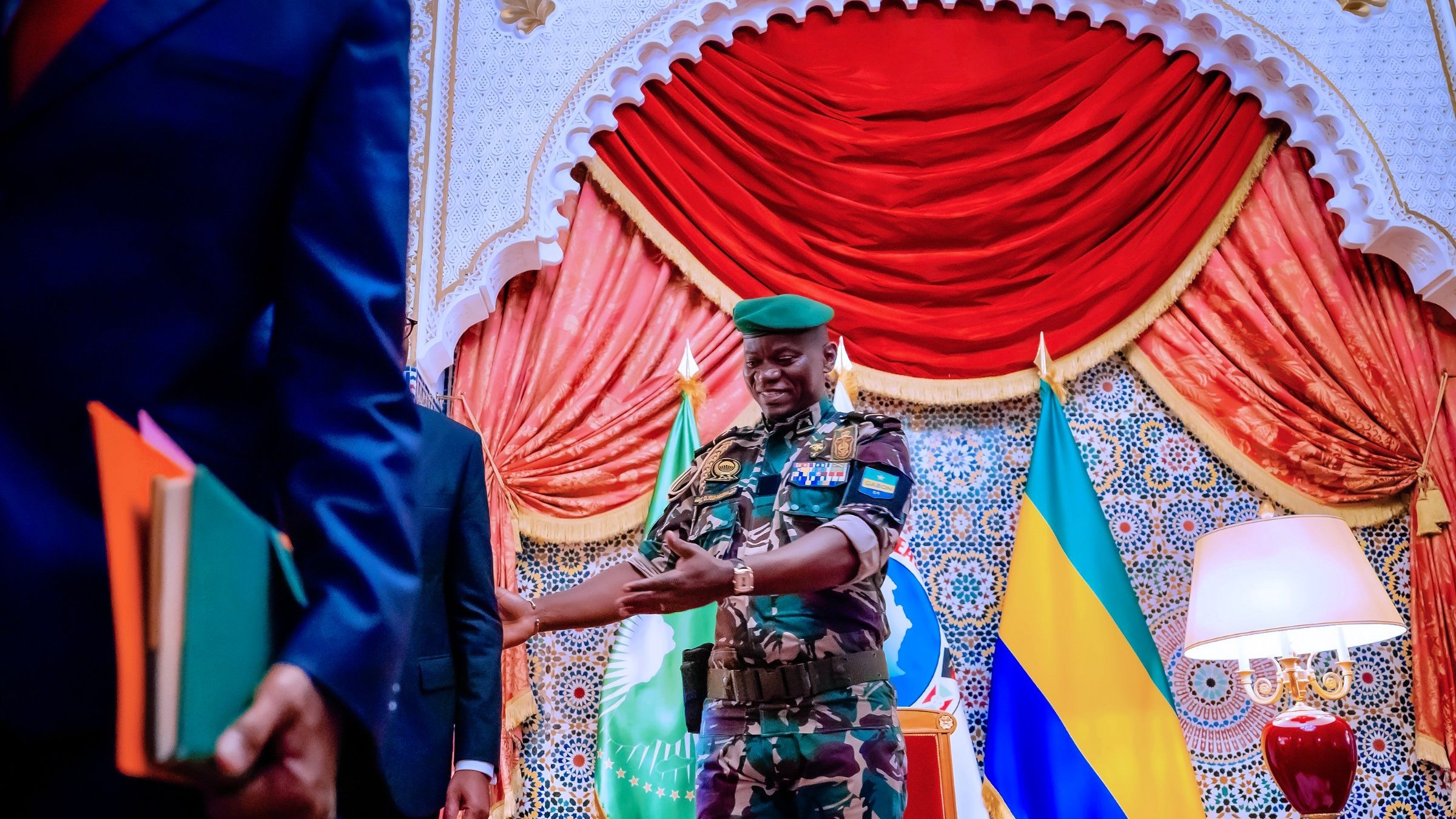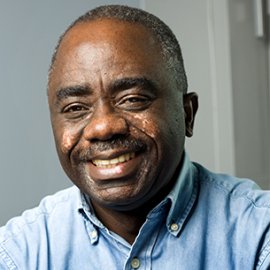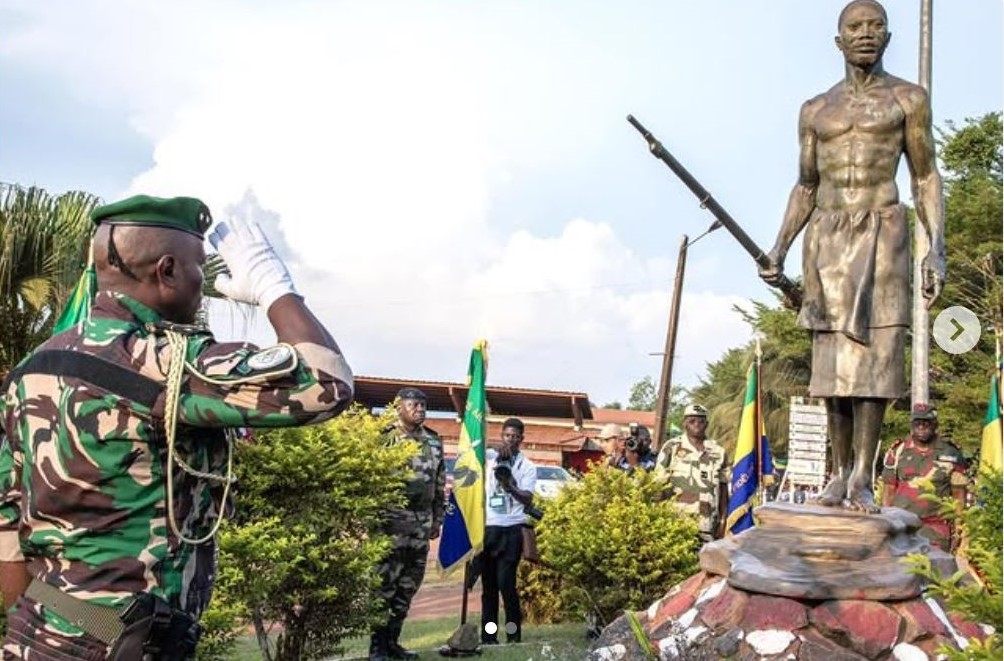
Everyone was surprised. Less than two years after the military coup of August 23, 2023 – led by General Brice Clotaire Oligui Nguema, which ended fifty-six years of rule by the Bongo family (Omar from 1967 to 2009, followed by his son Ali) – the spokesperson for the Committee for the Transition and Restoration of Institutions (CTRI), Séraphin Akure-Davain, announced on January 23 that the Gabonese presidential election would be held on April 12, ahead of the initially scheduled date of August 2025.
Twenty-three candidates submitted their applications (they had until March 8 to do so), but only four have been accepted so far. Unsurprisingly, the current head of the transition, Brice Oligui Nguema, is among them. The last Prime Minister under Ali Bongo (from January to August 2023), Alain-Claude Bilie-By-Nze, along with Stéphane Germain Iloko (a doctor) and Joseph Lapensée Essingone, a former executive of the Gabonese Democratic Party (PDG, the Bongo family’s party), complete the list. The activist and trade unionist Jean-Rémy Yama (imprisoned from 2022 to 2023, then appointed senator by the transitional regime) is among the rejected candidates. He allegedly failed to provide a copy of his father’s birth certificate proving his Gabonese nationality, one of the requirements set out in the new Constitution. He denounces a “masquerade”, stating that his parents’ nationality is already recorded on his own birth certificate.
For nearly two years, Gabon’s new strongman, Brice Oligui Nguema – whose country has a higher per capita income than South Africa thanks to its oil wealth – has promoted “restoration” and carried out a genuine charm offensive with the appearance of an electoral campaign. According to official speeches, this “restoration” was meant to restore “dignity” to Gabonese people, who were said to have felt “humiliated” by the former regime.
As sociologist and anthropologist Joseph Tonda explains in this interview, Oligui Nguema has sought to erase the fourteen years of Ali Bongo’s presidency, who has been weakened since his stroke in Saudi Arabia in 2018. The former head of state remains under house arrest in Libreville, while several members of his family, including his wife, Sylvia, are in prison.
“He wants to reassure the international community”
Michael Pauron: The announcement of the presidential election being held on April 12 surprised many observers… Why did Brice Clotaire Oligui Nguema move the election date forward?
Joseph Tonda: Brice Oligui Nguema had promised a presidential election in August 2025. By speeding up the timeline, he wants to convey the message that he does not intend to cling to power unconstitutionally. In doing so, he seeks to demonstrate his good faith while using a political manoeuvrer to maximise his political capital. This also allows him to outpace the opposition. Everyone who was not privy to the presidency’s plans was surprised by this announcement.
Michael Pauron: To whom is he addressing this message?

Joseph Tonda: First, he wants to reassure the international community. Secondly, he fears that by waiting too long, his popularity within the country may decline.
Michael Pauron: He waited until the last moment to announce his candidacy, even though it was hardly in doubt…
Joseph Tonda: This pattern is the same everywhere – the one whom people rely on or who holds the most political capital declares their candidacy last.
In reality, he has been campaigning since his coup d’état. He seeks to self-justify an unconstitutional act – because even though this “liberation coup” was welcomed by the population, it remains an unconstitutional takeover.
“For Ali Bongo, modernity was a hedonistic modernity”
Michael Pauron: In the latest issue of Politique africaine, dedicated to Gabon, you outline the reasons that led to the coup d’état on August 30, 2023. Among them are a rejection of foreigners, undertones of homophobia, and a deep sense of social downgrading and “humiliation”…
Joseph Tonda: When Ali Bongo took power in 2009, he quickly made moves to break away from the way his father, Omar, conducted politics. He got rid of the regime’s barons and appointed people from his own generation to key positions – essentially, the “youth”. He sought to present himself as a “modern” president, in tune with what was happening abroad, particularly in the United States, England, and France. However, what the people wanted were improvements in their daily lives.
Michael Pauron: So, this Western modernity did not appeal to the Gabonese people?
Joseph Tonda: For Ali Bongo, modernity was a hedonistic modernity. When he demolished the Cité de la Démocratie [a complex built in the 1970s to host an Organization of African Unity summit, editor’s note], where, for example, the congresses of the Gabonese Democratic Party (PDG, Omar Bongo’s party) were held and major international meetings took place, it was to turn it into a golf course. For him, modernity was also a matter of social norms, as seen in the decriminalisation of homosexuality in 2020. However, many intellectuals viewed same-sex relationships as unnatural and contrary to tradition, seeing this modernity as a regression. Those who opposed it perceived homosexuality as a return to an animalistic state.
For the Gabonese people, modernity lies in having decent salaries, being employed, and having the ability to consume. For them, modernity is about having roads. Modernity is having hospitals so that politicians and the privileged are no longer the only ones receiving medical care – typically abroad, where they also go to die. Modernity means that students can study in decent conditions in Gabon and do not have to go to Senegal, even though their country is supposedly very rich. For the Gabonese people, modernity is essentially social.
Michael Pauron: In your view, what were the turning points in Ali Bongo’s rule?
Joseph Tonda: The crisis following the contested 2016 election significantly weakened his hold on power. Long-standing nationality issues resurfaced. Ali Bongo is an adopted child of Biafran origin. He was therefore suspected of not being Gabonese and of being ineligible for the highest office. Then, during his first term, he surrounded himself with a controversial figure, Maixent Accrombessi, who is of Beninese origin. The Gabonese people accused him of leading a “foreign legion”, meaning a group of non-Gabonese figures placed at the heart of power.
This break from his father’s approach and his embrace of a Western (or “modern”) style of governance were marked by the decriminalisation of homosexuality in 2020. This decision deeply clashed with the cultural and anthropological sensibilities of the Gabonese people. They opposed it, arguing that foreign customs were being imposed on them.
The idea that there were many homosexuals within the government began to spread. I discuss this in my book Afrodystopia: there was an entire rhetoric, repertoire, and symbolism… Terrible rumours spread, such as the claim that Ali Bongo had “learned homosexuality” during his youth in Morocco…
Beyond these fantasies, a significant part of the Gabonese population opposed the decriminalisation of homosexuality, including political figures and academics who took firm stances against it. Everyone sought to capitalise on this popular rejection.
“The Gabonese people don’t have an inherently xenophobic nature”
Michael Pauron: Homophobia seems openly acknowledged, but the issue appears more complex when it comes to xenophobia…
Joseph Tonda: I don’t believe the Gabonese people have an inherently xenophobic nature, but tensions can arise. I remember the 1978 crisis between Omar Bongo and his Beninese counterpart, Mathieu Kérékou: riots broke out against the Beninese population living in Libreville and Port-Gentil.
But when we look at daily interactions with those referred to in Libreville as “West Africans,” there are no issues; it is simply part of the Gabonese social norm. Even in the most remote villages, you can find Cameroonians, Malians, Senegalese… It doesn’t cause any issues, especially since these individuals are seen as “useful” to the society, often working in small businesses and being highly resourceful. At universities, foreign teachers have never encountered any issues.
Xenophobia starts from the top, driven by those with political ambitions who manipulate the issue: “If you have problems, it’s because of foreigners.” Omar Bongo also had foreigners around him. And he himself was accused of being either Congolese or Central African. But when he passed away, he was mourned by all Gabonese people…
Michael Pauron: However, we cannot ignore the slogan “Gabonese first”… Isn’t there a nationalist shift?
Joseph Tonda: This nationalist shift can be explained by the fact that Gabonese people felt humiliated by Ali Bongo, who was suspected of being Biafran, by his chief of staff Maixent Accrombessi, who was of Beninese origin, and by his so-called foreign legion. Ali Bongo’s wife, Sylvia, is French, as was one of his closest advisers, Brice Laccruche Alihanga [imprisoned in 2019 and released in 2023, Editor’s note].
This last case is particularly interesting. When the president suffered a stroke in Saudi Arabia on October 24, 2018, Brice Laccruche Alihanga was the chief of staff to the head of state. A few months later, during a “republican tour”, he began to gain popularity among the population, who started considering voting for him. His white skin was never an issue.
The hypothesis of racism or xenophobia in Gabonese society must therefore be nuanced by the political context. Brice Oligui Nguema himself stated that he felt humiliated after Ali Bongo’s stroke by those around him, particularly by Bongo’s son, Noureddin, who constantly repeated, “Papa said, Papa said,” and treated him like a subordinate. This nationalist refocusing also serves a purpose: to strengthen popular support.
Furthermore, for fourteen years, this regime displayed arrogance and openly flaunted its personal wealth.
“The “restoration” is primarily in an effort to erase the fourteen-year rule of his son”
Michael Pauron: Regarding the “restoration”, you say it is not merely a return to the past. What exactly does it entail?
Joseph Tonda: During colonisation, Gabonese people fought for the same rights as the colonisers – it was a matter of “dignity”. For them, decolonisation did not necessarily mean “driving out the coloniser”. Léon Mba used to say that a part of Gabon remained French, and Omar Bongo [who took power after Léon Mba’s death in 1967, ed.] never deviated from this framework. Many Gabonese people today have family in France.
This sense of “dignity” persisted throughout the colonial period, and Brice Oligui Nguema’s “restoration” should be understood in relation to Ali Bongo’s fourteen years in power. They created a feeling of oppression, in the sense that “it doesn’t feel breathable”. When the coup d’état took place, people were saying, “Ouf! We can breathe!” This oppression had to be eliminated, and institutions, as they operated during Omar Bongo’s era, had to be restored. But not exactly to the letter: a sweeping change was needed, a thorough cleanup had to be done.
The “restoration” mentioned by the transitional authorities is therefore primarily about reinstating the institutions of Omar Bongo, in an effort to erase the fourteen-year rule of his son, Ali.
It is also about invoking symbols by commemorating national heroes – for instance, by paying tribute in southern Gabon to the statue of Wongo, an Awandji warrior who led a revolt against the French coloniser in the 1920s.

Another symbol of this restoration is the Transitional President’s marriage to a second wife. This act allowed Gabonese people to “breathe” in response to the perceived “threat” of homosexuality. For them, Oligui Nguema is restoring traditions and reaffirming traditional values. It is about restoring a sense of “cultural dignity”.
Michael Pauron: How does Oligui Nguema embody this restoration?"
Joseph Tonda: It is expressed through the body of power: Ali Bongo’s failing body after his stroke oppressed the Gabonese people, who felt humiliated by a president on the verge of collapse, a president described as a “mummy”, not truly present, and becoming the laughingstock of other nations. It was necessary to restore virilist values.
This tradition of virility is evident among the military, who have inherited it from colonial rule. It was a command-based power, a military administration. Oligui Nguema himself is a military officer and does not hesitate to appear in a military uniform.
The martial aspect is accompanied by intellectual agility: with his illness, President Ali Bongo had lost both his intellectual and physical agility. Oligui Nguema symbolises physical strength, intellectual sharpness, and cultural heritage.
“The only true ideology is money”
Michael Pauron: Does he also intend to restore the political system established by Omar Bongo?
Joseph Tonda: Omar Bongo had created his own geopolitical system: he appointed a “little Bongo” at the head of each province, who was meant to rule. This representative of Bongo’s authority was highly respected: for instance, intellectuals returning from abroad with their degrees had to be endorsed in their province. Each regional leader was responsible for redistributing wealth in one way or another, notably through a system of co-optation to serve Bongo. Oligui Nguema is restoring this system in a more subtle way, modernising it.
Michael Pauron: The day after he took power, Brice Oligui Nguema invited civil society to take part in the reforms he aimed to implement. A few prominent figures responded positively, including environmental activist Marc Ona Essangui. Does the “restoration” of a system they have long fought against put these activists in a difficult position?
Joseph Tonda: The issue of civil society is a complex matter. There is no doubt that it exists in Gabon. But aren’t its interests inevitably tied to its sources of funding? There was a time when everyone was starting an HIV advocacy association, claiming to be part of civil society to secure funding. What are the true ambitions of civil society? Isn’t that also the path of civil society – to eventually assume power?
Jean-Rémy Yama, a renowned trade unionist and pro-democracy activist who was imprisoned in 2022, is now a senator. He founded his own party. This does not prevent him from taking critical positions against the government – the same government that freed him from prison – and declaring his candidacy for the presidential election on April 12.
The boundary between civil society and the “traditional” political opposition is very thin.
Michael Pauron: The “traditional” opposition has remained relatively silent during this transition period. The 2023 candidate who claimed victory, Albert Ondo Ossa, is not running again in April… What does this withdrawal signify?
Joseph Tonda: There have always been connections between the government and the opposition. The father did not hesitate to bring opposition members into the government. Pierre Mamboundou may be the only one who resisted until the end. The others eventually gave in.
I’m not sure how much influence someone like Albert Ondo Ossa has on the political scene today. In my opinion, Jean Ping no longer holds any weight and remains very silent. The current situation is likely to reshuffle the opposition, which seems completely paralysed. The future on that front is quite uncertain.
Until now, the Gabonese opposition has always puzzled me: typically, an opposition and a ruling power clash over a vision of the world, over a political ideology. What are the political ideologies that define the confrontation between the opposition and the ruling majority? My hypothesis is that the only true ideology is money. It is a materialistic ideology. It is a form of fetishism.
Michael Pauron: Religion seems to play a significant role within the new government. What exactly is its place?
Joseph Tonda: By proclaiming himself as Joshua, he consolidates all the symbolic and institutional resources of power. This power carries a strong mystical dimension. Religion was already a fundamental part of power during Omar Bongo’s time. When Omar Bongo converted to Islam, other political figures followed suit to secure positions. And he too fostered the idea that he was leveraging traditional religious power. Added to this was the Equatorial Masonic Lodge, of which he was the grand master. Since Oligui Nguema’s arrival, there has been an evident manipulation of religious sentiment.
If you believe in the importance of open and independent journalism:

